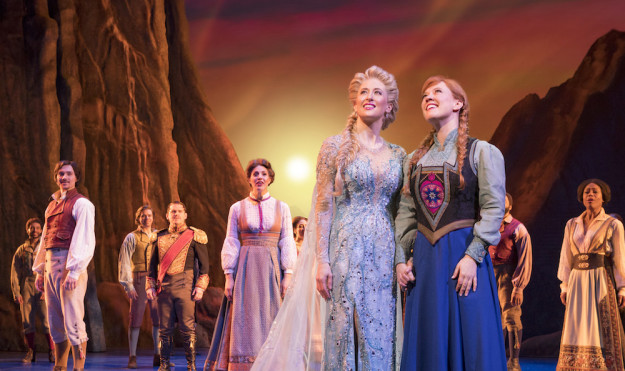
Yes, you’ve heard “Let It Go” 8 million times — but have you heard it belted from a Broadway stage?
Anna and Elsa are perfectly cast.

Caissie Levy and Patti Murin had big shoes to fill stepping into the respective roles of Elsa and Anna: Idina Menzel and Kristen Bell delivered distinctive vocal performances in the 2013 Disney film. That makes the work Levy and Murin are doing here all the more impressive. It’s not just that they sound great — and they really do — but that they completely make the characters their own. Both have landed on the ideal blend of vulnerability and determination, making the sisters deeply sympathetic while also forces to be reckoned with. The Broadway iterations of Anna and Elsa will be familiar to fans of the film, but they also feel like unique creations specific to these new actors. That’s a thrill to those of us who want to see Disney stage musicals that are inspired by but not carbon copies of the original films.
Deen Van Meer
The whole cast is great, actually.
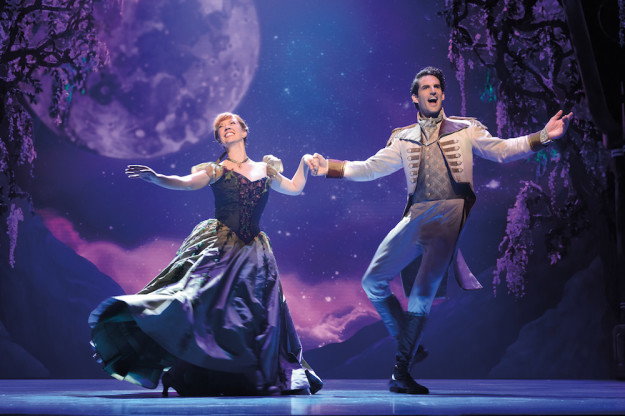
As with Levy and Murin, the strength of this cast is in their ability to evoke the feel of Frozen the movie while making sure Frozen the musical emerges as its own thing entirely. Jelani Alladin is Jonathan Groff–level charming as Kristoff, but it’s fantastic to see a black actor in the role, given the dearth of characters of color in the Disney canon, particularly as romantic leads. (It’s worth noting that Anna and Elsa’s father, King Agnarr, is also played by a black actor, James Brown III.) John Riddle is unbearably likable as Hans — like, it’s actually deeply uncomfortable because you know he’s going to reveal himself to be a tool — and he has one of the most powerful voices in the cast. And Greg Hildreth manages to bring a soulfulness to Olaf, who is, you know, a talking snowman. He’s comic relief, sure, but Hildreth makes sure that you’re rooting for him at the same time. Speaking of…
Deen Van Meer
They got the sidekicks right.
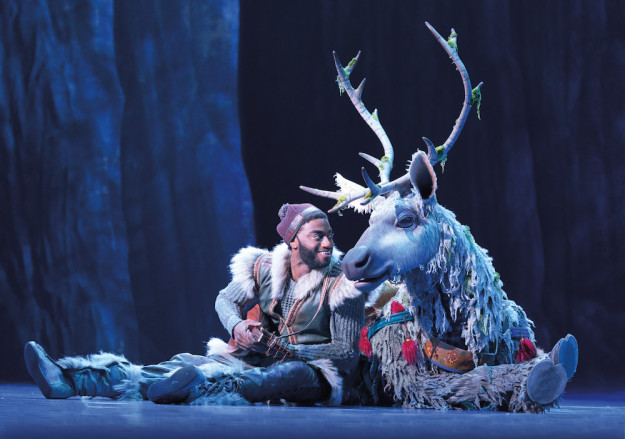
One of the biggest bummers about 2011’s Aladdin musical was the absence of Abu the monkey and Rajah the tiger. Yes, Iago was still there — but he was a man, not a parrot, and that’s just not the same! Disney musicals have given us animals before — most notably, uh, everyone onstage in The Lion King. That was done through the highly stylized, innovative puppetry of Julie Taymor. Frozen opts for a more realistic approach, and it works remarkably well. Sven the reindeer is impressively true to life — or at least true to the animated reindeer we know and love — which makes him an actual character. Olaf is a little more theatrical: We see Greg Hildreth, the actor playing him, the whole time. But it’s just as effective — he’s a complete joy to watch.
Deen Van Meer
The score includes some serious new bops.
Like many modern Disney movies, the Frozen film has some great songs — but not enough for a full-length stage musical. Oscar-winning songwriting team Kristen Anderson-Lopez and Robert Lopez (the youngest EGOT-er ever!) returned to write brand new songs, including Elsa’s 11 o’clock number, “Monster,” which I have listened to on repeat so many times that I may require an intervention. It may not have the soaring “I Want” song appeal of “Let It Go,” but it’s also dangerously catchy — and dark in a way that Disney often shies away from. The other highlights include the very sweet “True Love,” sung by a nearly frozen Anna, and “Hygge,” a thoroughly delightful second-act opener that celebrates the Danish concept of aggressive coziness.
It feels queerer than ever.
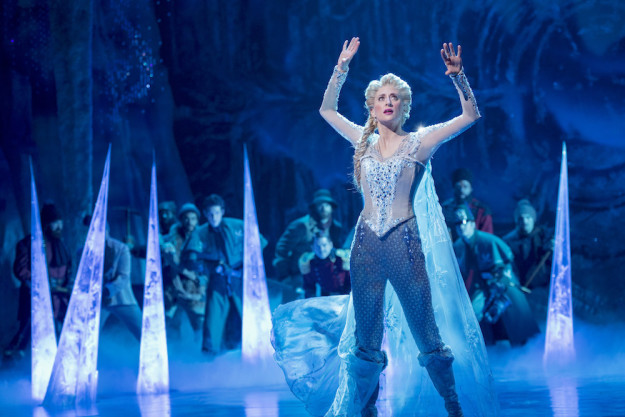
Look, it’s 2018: Elsa wearing pants does not make her gay. And yet, this was a conscious choice that helps Elsa stand out from the other Disney princesses (or queen, in this case) — and it’s also the logical conclusion of an arc that involves Elsa rejecting the life that has been thrust upon her and choosing her own path instead. As soon as Elsa drops her “conceal, don’t feel” mentality and embraces her true identity, she ditches a traditionally feminine aesthetic, and while that’s not “exclusively gay,” it’s not meaningless either. To be fair, the musical’s subtle queerness isn’t that radical a departure from the movie, which was pretty gay to begin with. “Let It Go” is absolutely a song about coming out, and Elsa doesn’t get a male romantic partner in the film — in fact, there’s a campaign to give Elsa a girlfriend in Frozen 2, which seems…highly unlikely to happen. But the Frozen musical does at least feel like a step in a slightly queerer direction: Just as “Let It Go” is a song about coming out, “Monster” is a song about being ostracized for your sexual identity. Work with me here.
Deen Van Meer
That Disney magic is real.
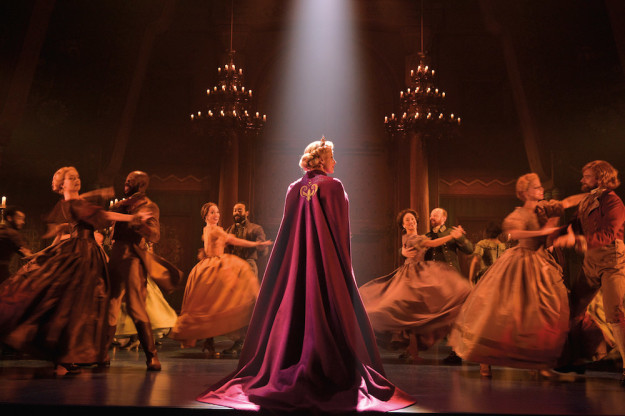
I’ll be honest: Frozen does not always look as grand and opulent as it should. Some of the effects are muted, mostly done with projections that feel, at times, a little lazy. And yet, you get carried away by Frozen, which has the kind of Disney magic that’s been missing from some of Disney’s other musical adaptations. (Sorry, Little Mermaid, but it’s true.) When I say magic, I’m not just talking about Elsa’s “Let It Go” quick change — but oh my god when I tell you I gasped — but rather that feeling of something special and warm and, yes, hygge that envelops you by the end. Even though I didn’t see Frozen the movie until I was an adult, the musical still inspired weirdly nostalgic feelings that made me feel like a kid again. This is the kind of show that makes you go from “I’m too old for this” to “Wait, why am I crying?”
Deen Van Meer

